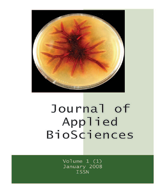Journal of Applied Biosciences (J. Appl. Biosci.) [ISSN 1997 - 5902]
Volume 74: 6072 - 6079 Published February 28, 2014.
Isolation,
characterization and primary screening of soil actinomycetes from
Kenyatta University arboretum grounds for antibacterial activities
Osborn Yamakhakha Khasabuli and Anthony Nyamache KiberaKenyatta University (main campus), P.O. Box 43844, Nairobi, Telephone: Tel: +254 20 8710901, +254 20 8711622, Fax: +254 20 8711575, Website: www.ku.ac.ke . Email: info@ku.ac.ke.
Khasabuli10@gmail.com and akibera2000@gmail.com
Original submitted in on 9th November 2012 Published online at www.m.elewa.org on 28th February 2014. http://dx.doi.org/10.4314/jab.v74i1.12
ABSTRACT
Objective : Antimicrobial resistance has increased drastically in recent years in the developing countries, and it has leading public health concern. With almost all organisms becoming multidrug resistant to the commonly used antibiotics, there is a need to search for more drugs that are novel in order to address this challenge. Therefore, this study was aimed at isolating antimicrobial producing actinomyscetes and to evaluate their secondary metabolites against selected multidrug resistant bacteria isolates.
Methodology: Half kg soil samples were collected 15cm below the ground. Starch Casein Agar (SCA) was used to isolate actinomycetes. Fifteen different actinomycetes identified as Is.1-Is.15 were isolated. They were differentiated based on the difference in appearance of the colony morphology and mycelial structure. Their metabolites were tested for antibiotic activities through the primary screening using the disk diffusion methods. Test bacteria were; Bacillus subtilis, E.coli, Klebsiella Pneumoniae, Staphylococcus aureus, Shigella sonei and Salmonella typhi. All the secondary metabolites from the isolated actinomycetes proved to posses the ability to inhibit bacterial growth by formation of different sized halo zones.
Conclusion and application: Secondary metabolites produced by actinomycetes have the ability to inhibit growth of pathogenic bacteria. The ability of these metabolites to inhibit growth of test pathogenic bacteria has been attributed to the establishment of the fact that novel antibiotics can be manufactured from metabolites produced by actinomycetes. Large scale manufacture can be done through purification of these metabolites to ensure large scale production of novel drugs. This can serve help clear pathogenic bacteria that are ever developing resistance on the available antibiotics.
Key words: Actinomycetes, metabolites, soil, antimicrobial activity
FULL PAPER [PDF AVAILABLE HERE]

